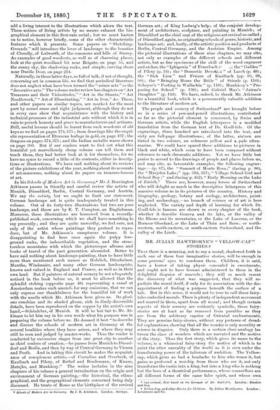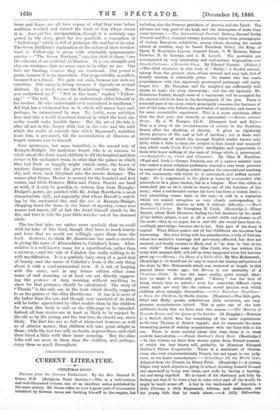MR. JULIAN HAWTHORNE'S " YELLOW-CAP " STORIES.t
THAT there is a meaning, not to say a moral, shadowed forth in each one of these four imaginative stories, will be enough in some persons' eyes to condemn them. Children, it is said, have a horror of taking physic concealed in sweetmeats, and ought not to have lessons administered to them in the delightful disguise of marvels ; they will so much resent the discovery of what was suggested, that they will re- pudiate the moral itself, if only for its association with the dis- appointment of finding a purpose beneath the surface of a tale. But in this sense, it would not be true to call those fairy- tales embodied morals. There is plenty of independent movement and marvel in them, apart from all moral ; and though certain aspects of their scenery are evidently symbolic, these fairy. stories are at least as far removed from parables as they are from the arbitrary caprice of Oriental enchantments. They are genuine fairy-stories, without any pretence of dread. ful explanations showing that all the wonder is only morality or science in disguise. Only there is a certain close analogy be. tweed the class of wonders which are narrated and the motive of the story. Thus the first story, which gives its name to the volume, is a whimsical fairy-story the motive of which is to paint the utter unreality of the world as it is seen under the transforming power of the talisman of ambition. The Yellow- cap, which gives so, bad a headache to him who wears it, but gains so profound a worship from those who see it, not only transforms the rustic into a king, but into a king who is nothing but the hero of a theatrical performance, whose counsellors are all different forms of the same false spirit, and whose own • Sr fur/and; Test based on the German of Dr. Gull-felt. London : Mackie and Son.
t Yellow-Cap, and other Stories for Children. By Julian Hawthorne. Loudon :. Longman@ and Co. loves and hopes are all base copies of what they were before ambition touched and turned the head of him whose crown it is. And yet this interpretation, though it is certainly sug- gested by the story, gives far too parabolic a conception of " Yellow-cap," which is full of grotesque life and fun of its own. The Seven Brethren's explanation of the nature of their brother- hood to Yellow-cap is given with admirably epigrammatic gravity :—" The Seven Brethren," says the chief of them, "are the outcome of an artificial civilisation. It is our strength and also our weakness that we never seem to be what we are. Our laws are binding, because they are irrational. Our power is great, because it is an imposition. Our respectability is perfect, because it is a fraud. We gain our ends, because our ends are ourselves. Our union is strong, because it depends on mutual distrust. In a word, we are the Everlasting Unreality. Have you understood me ?" "Not in the least," replied "Yellow- cap." "'Tie well. No one of us understands either himself or his brother. He who understands or is understood is anathema." All that has a whimsical fun in it, which will amuse boys and, perhaps, be remembered by men. No doubt, mere ambition does lead into a world of mutual distrust in which the least sin- cerity would make terrible havoc. But the art of the tale is after all not in this deeper drift, but in the verve and life with which the world of untruth into which Raymond's ambition leads him, is presented, till the accumulation of illusions at length restores him to himself.
Less grotesque, but more beautiful, is the second tale of Rumpty-Dudget, the malicious dwarf, who is so anxious to catch one of the three royal children to fill the hundred and first corner in his enchanted room, in order that the palace in which they had lived so happily might vanish away, the forest of mystery disappear, and the grey mist swallow up the blue sky, and drive back fairyland into the remote distance. The scenes after Prince Hector is secured for the hundred and first corner, and while Princess Hilda and Prince Harold are hard at work, if it only be possible, to redeem him from Humpty- Dudget's power, are painted with Mr. Julian Hawthorne's most characteristic skill, and especially that where Harold is watch- ing by the enchanted fire, and the axe of Rumpty-Dudget, chopping down the trees in the forest of mystery, comes ever nearer and nearer, till at last the dwarf himself stands by the fire, and tries to wile the poor little watcher out of his charmed circle.
The two last tales are rather more symbolic than we could wish for tales of this kind, though they have so much beauty and force that we would not willingly spare them from the book. However, we think Mr. Hawthorne has made a mistake in giving the name of Abracadabra to Caladon's home. Abra- cadabra is a well-known name for a mystification, rather than a mystery,—and the tale of Caladon has really nothing to do with mystification. It is a symbolic fairy-story of a good deal of beauty, and the name of Caladon's home is the only thing about it with a semi-nonsensical turn. It is out of keeping with the story, and in any future edition either some name of real meaning, or at least one not directly suggest- ing the pretence of deep meaning without anything to show for that pretence, should be substituted. The story of " Theeda" is the only one in the book which directly suggests to us the genius of the elder Hawthorne. It has in it more of the father than the son, and though very beautiful of its kind, will be better appreciated by older readers than by the children for whom this book is said on the title-page to be intended.
Indeed, all four stories are at least as likely to be enjoyed by the old as by the young, and the last two, we should say, more likely. The first two are so full of whimsical humour, as well as of ulterior motive, that children will take great delight in them ; while the last two will, no doubt, impress them, and chill their blood a little with their inner meaning. But the older folks will see more in them than the children, and, perhaps, enjoy them as much throughout.







































 Previous page
Previous page